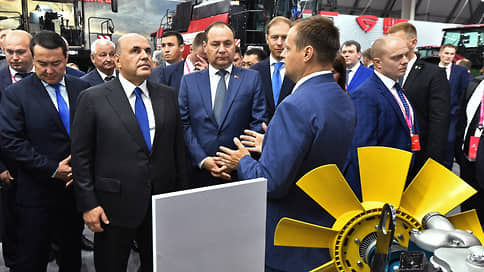Mishustin demanded a technological breakthrough from the industry
[ad_1]

The first day of the Innoprom exhibition in 2023 was supposed to show that the industry in the Russian Federation has adapted to the sanctions and faces new challenges – technological development without relying on imports. The non-standard plenary session for the exhibition with the participation of foreign ministers and the Russian-Chinese EXPO resumed after covid VII should have convinced the participants that they could overcome the sanctions shocks – foreign delegations were a confirmation of the success in replacing departed partners with friendly ones. If until now they were seen as a way to quickly patch up the gaps in the Russian economy due to disrupted supplies and problems with settlements, now partners are required to cooperate and joint investment projects not only in the Russian Federation, but also outside it. However, it is still possible to talk about the adaptation of enterprises and the technological future only in a regulatory context: real production requires at least certainty in order to increase investment.
Prime Minister Mikhail Mishustin arrived on Monday, July 10, in Yekaterinburg for the traditional review of the achievements of Russian industry – throughout 2022, the authorities adapted old and launched new measures to support the industrial sector, which was most affected by sanctions due to the Russian military operation in Ukraine.
At the plenary session, the prime minister said that companies in 2022 received 140 billion rubles. concessional loans under the programs of the Industrial Development Fund for the development of the necessary materials and components.
More than 150 loans for almost 14 billion rubles. issued for the purchase and reconstruction of production facilities under the industrial mortgage program, 12 projects worth 320 billion rubles were approved as part of the cluster investment platform of the Ministry of Industry and Trade. for the production of priority products (and 40 more with a volume of more than 1 trillion rubles are being developed).
By mid-2023, the measures had an effect – at least as the head of government himself declared: “The country is consistently coping with all the challenges. Over the past four years, industrial production has increased by 7%. At the same time, this year the positive dynamics has accelerated, and this is in the context of a break in supply chains and unprecedented sanctions pressure. In March, the growth of this indicator was more than 1%, in April – more than 5%, and in May it already exceeded 7% in annual terms.
From restoring the working capacity of the industrial sector, the prime minister moved on to plans: the manufacturing sector will have to change qualitatively – it is necessary to reduce the impact of unfavorable external conditions and achieve full-fledged technological sovereignty in all critically important industries without exception.
“There will be no return to the previous models of work – based on the import of foreign technologies,” he stated.
Accordingly, the topic of Innoprom in 2023 was announced as “Sustainable production: renewal strategies”. However, it is probably too early to talk about the full adaptation of the Russian industry to the sanctions – we can rather talk about the infrastructure and the regulatory framework ready for these purposes. The launch of replacement industries takes time, products need to be improved to a competitive state, while technological renewal will cost money: in 2023, it is necessary to provide at least 2 trillion rubles. investments in priority projects, and up to 10 trillion rubles by 2030, but not only money, but also political and economic certainty, which are still far away.
Nevertheless, small but tangible successes in industries should have convinced the guests of the exhibition of the seriousness of intentions: in the aviation industry, the Il-96-400M wide-body airliner is preparing for the first flight, work on replacing foreign systems and assemblies with domestic developments is being completed on the flagship MS-21 . “And everything is going according to plan,” Mikhail Mishustin listed the successes. The numerous presence of foreign delegations should have also testified in favor of the “new normality” (although the list of participating countries has changed a lot). Thus, over a thousand companies from more than 35 countries are represented at the exhibition, which “gathered to establish direct contacts,” the prime minister said. In particular, the site also hosts the 7th Russian-Chinese EXPO, where for the first time after covid restrictions about 500 companies from China participate.
The plenary session this year was also not limited to the speeches of Mikhail Mishustin and his colleagues Roman Golovchenko and Alikhan Smailov, the Prime Ministers of Belarus (the partner country of the exhibition) and Kazakhstan (became a hub for solving the logistical problems of Russian business in 2022). They were joined for the first time by ministers from Asian and African countries – a total of 11 people, including from Armenia, Uzbekistan, Tajikistan, Myanmar, Zimbabwe.
The international plenary, along with a large-scale exhibition, were supposed to prove that the Russian Federation retains its participation in the global market, and the functions of friendly partners are expanding.
If in 2022 they were required to “help” Russian businesses solve problems with financial settlements and stabilize deliveries that fell due to restrictions, then in the future they are expected to cooperate and implement joint projects from such countries.
As an example, the session participants considered cooperation with Belarus, in which dozens of Belarusian factories manufacture components for Russian automakers, and companies in the Russian Federation produce engines for Belarusian special equipment: in total, 17 projects have already been approved for almost 80 billion rubles. However, the model of “techno-sovereignty for two” is hardly replicable: with none of the participants, except Minsk, Moscow has a long history of existence in the form of a “union state”, and the deepening of international cooperation, including with Chinese partners, obviously conflicts with idea of ”technological sovereignty without imports”.
[ad_2]
Source link






